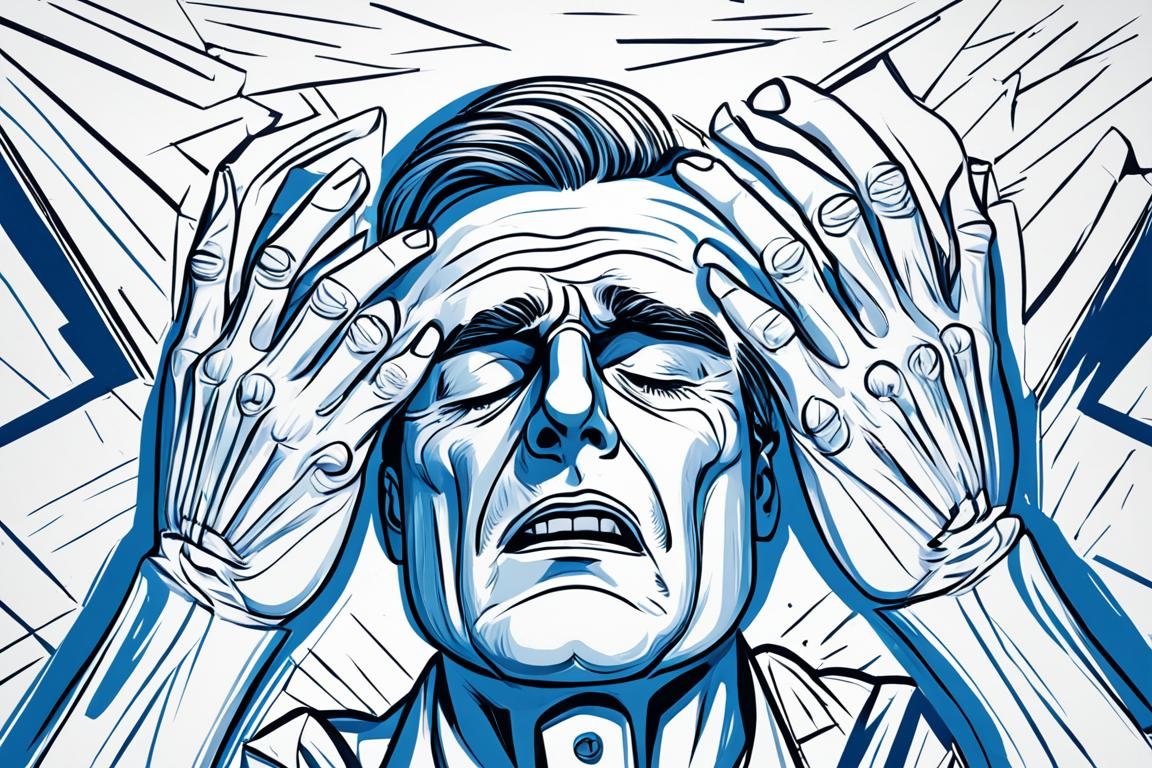Do you wake up and find your hands sore and stiff? You might have been sleeping with clenched fists. This is called sleep bruxism or nocturnal muscle tension. Many things can cause this, from stress-induced clenching to medication-related muscle pain. It seems harmless, but knowing why can help you sleep better.
It’s interesting that babies often clench their fists before falling asleep, but they let go as they sleep. For adults, this can come from emotional anxiety or stress, or physical exertion and tension. Certain medications like stress and antidepressants might be a cause. So can some health problems like epilepsy, rheumatoid arthritis, and schizophrenia. The good news is, in most cases, sleeping with clenched fists doesn’t hurt your sleep.
Sometimes, nerve compression due to sleeping position can also make your hands numb or clenched. This comes from the second source. They also talk about parasomnias. These are weird sleep habits, like teeth grinding, that may make you clench your fists at night.
Key Takeaways
- Clenching fists during sleep is a common problem, often from stress.
- Things like tension and certain medications can also be a cause.
- Sometimes, health issues like epilepsy and arthritis are to blame.
- Bad sleeping position can make your hands numb and clenched.
- Weird sleep habits, like teeth grinding, might also make you clench your fists.
Introduction
Many people sleep with clenched fists. This can cause minor issues when waking up. It’s key to know why this happens.
Significance of Sleeping with Clenched Fists
Clutching your hands while asleep is often a way for our brains to deal with emotions and memories. It usually happens after a tough day or before a big event. Yet if it happens a lot, or if you feel pain or see swelling, you should look for the causes.
Overview of Potential Causes
Sleeping with clenched fists might come from being stress or anxious. It can also be due to muscle tightness if you’re facing physical discomfort. Some medicines or health conditions could lead to this. Knowing these reasons is the start to solve the problem.
Emotional Factors
Recent studies link hand clenching during sleep to bruxism, which is grinding teeth. These actions activate the brain’s sensorimotor cortex. More than 70% of people who grind their teeth have higher anxiety and stress. If you grind your teeth at night, it might be because you’re really stressed.
Anxiety and Stress
Being very anxious or stressed can show in how you sleep. These feelings cause your body to react. You might clench your fists or jaw without meaning to. This can help your body deal with all the stress you feel inside.
Connection with Bruxism
There’s a cool link between grinding teeth and clenching fists while sleeping. Both make the same parts of the brain active. People who grind teeth often clench their fists too. This could be because anxiety and stress underlie both issues.
Physical Factors
Your sleeping position and day time activities can affect fist clenching at night. Physical work, tension, and pain might show in your hands while asleep.
Exertion and Tension
Starting a sport like weightlifting can make your muscles tight. This can lead to tight fists at night. Also, if you’re experiencing back pain or aches, you might clench your fists while sleeping.
Pain or Discomfort
It’s crucial to drink plenty of water. Lack of water can cause muscle cramps. This adds to the chance of fist clenching during sleep. Solving muscle pain and tension issues can help stop this sleep problem.
Medication-Related Causes
Some medicines can make you clench your fists when you sleep. For example, cholesterol pills (statins) might raise a certain enzyme in your blood. This could cause muscle pain, especially in women. Also, antidepressants could make your joints and muscles hurt. So, if your cholesterol or antidepressant medicines changed lately, they might be why you clench your fists at night.
Cholesterol Medications
Women often feel muscle pain from cholesterol medications. These pills can boost a blood enzyme. This leads to muscle pain and cramps, which might make you sleep with clenched fists.
Antidepressants
Taking antidepressants may make your joints and muscles ache. This pain could be linked to clenching your fists while you sleep. If you started or changed your medicines for things like depression or anxiety, think about this as a possible cause.
| Medication Type | Potential Impact on Sleep |
|---|---|
| Cholesterol medications | Increased creatine kinase, leading to muscle pain and cramping |
| Antidepressants | Joint pain and muscle aches |
Did you recently switch up your medications? It’s worth looking into how they might be connected to your clenched fists during sleep. Talking to your doctor can shed light on whether the medicines play a role and what you can do about it.
Underlying Medical Conditions
Clenched fists at night may not just be from fear and worry. They can also be linked to health problems. For example, epilepsy, rheumatoid arthritis, and schizophrenia can cause this issue.
Epilepsy
Epilepsy can cause fists to tighten up. This happens because of sudden brain activity. But, this can be a problem both day and night, not just when sleeping.
Rheumatoid Arthritis
If someone has rheumatoid arthritis, their joints might hurt a lot. This could make them clench their fists while asleep. Many adults, about 24%, have some form of arthritis, which can lead to this sleep issue.
Schizophrenia
Schizophrenia is a serious mental health condition. It can also make people’s muscles move without control. This includes clenching their fists. But also, this can happen when they are awake, not just when sleeping.
Remember, medical problems can make you clench your fists. But, there’s no clear link between sleep apnea and this issue. Doctors are still learning more about this connection.
sleeping with clenched fists
If you wake up with clenched fists, don’t worry. There are easy steps to help. A first tip is to check out what can help you:
Documenting Changes
First, write down any new changes in what you eat or take. Look at what changed when you started waking up like this. It might show you what’s wrong and how to fix it.
Stress Reduction Techniques
Try to reduce stress at night. You can do this with things like meditation, deep breathing, or listening to calm music. Taking a warm bath is also a good idea that can make a big difference.
Reducing Stimulants
Try not to have too much caffeine, nicotine, or sugar late in the day. These things can mess with your sleep and make your muscles more tense.
Magnesium Supplementation
Ask your doctor about taking a magnesium supplement. It might help relax your muscles and stop your fists from clenching.
Staying Hydrated
Drink enough water and make sure to keep your electrolytes up. Not being hydrated well can lead to muscle cramps during sleep.
Holding an Object While Sleeping
Sleeping with a squeeze ball or a pillow in your hands might help. It can stop your hands from closing too tight while you sleep.
These tips can really help you. They might make your clenched fists less often and intense. This can lead to a better sleep at night.
Potential Benefits
Some people sleep with clenched fists. This habit has benefits, as research shows. It helps in coping with physical discomfort and feeling control and empowerment.
Coping with Physical Discomfort
Sleeping with clenched fists may help bear physical discomfort. When you grip your hands tightly, your body might release endorphins. These are chemicals that reduce pain naturally. So, this can make it easier to deal with any physical pain or muscle soreness.
Sense of Control and Empowerment
This habit also boosts sense of control and empowerment. Closing your hands tightly in sleep can make you feel more confident and in charge. This is great, especially for those who worry a lot or feel like they have no control in life.
Although the benefits of sleeping with clenched fists are not obvious, they exist. Knowing these can change how you see this habit. It might help you use it in a positive way for your health.
Seeking Professional Help
If you can’t sleep because of your clenched fists, it’s time to get some help. A sleep expert can check what’s wrong. They will make a special plan just for you to fix the problem.
When to Consult a Sleep Specialist
Think about places like the Jacksonville Sleep Center. They help people with sleep problems. If squeezing your fists is still a problem, they might be able to help.
A sleep expert will look at why you clench your fists when sleeping. They do tests and make a plan that fits just for you. Their goal is to make your sleep and life better.
Sleep Positions and Nerve Compression
Your sleeping position matters a lot for your nerve health. Studies show that how you sleep can affect nerves like the ulnar, median, and radial nerves.
Ulnar Nerve Compression
Bending your elbow too much puts strain on the ulnar nerve at the inner elbow. This can cause your ring and little fingers to feel numb or tingle.
Median Nerve Compression
Lying on your stomach can make your arm and wrist positions bad, hurting the median nerve. This could make carpal tunnel syndrome worse, making your hand swell, feel numb, or tingle.
Radial Nerve Compression
Sleeping in a fetal position bothers the nerves in your wrists and elbows, leading to discomfort. Changing how you sleep can help young people feel better from these symptoms.
To help your arm and hand nerves, keep your spine’s natural shape from head to hips. If you use small pillows under your elbows and knees or between your legs, it takes pressure off those nerves.
Feeling swelling, numbness, or pain in your hands for too long could need a hand therapist’s advice. They can guide you on better sleep positions and offer devices that keep your joints in good shape, helping your nerves, muscles, and joints feel better.
Parasomnias and Abnormal Sleep Behaviors
Parasomnias are sleep disorders with weird actions during sleep. They can affect anyone but often trouble kids more than grown-ups. A detailed look at parasomnias offers info on what causes them, their signs, and how to treat them.
Types of Parasomnias
Sleepwalking, talking in sleep, and groaning while asleep are common. So are nightmares, night terrors, bedwetting, and teeth grinding. These actions can happen in any sleep stage. They might be because of stress, worry, medicine, or health issues.
Causes of Parasomnias
Kids get parasomnias more, maybe due to their sleep patterns not fully developed. Health issues like epilepsy or ADHD could play a part. Stress or not sleeping enough can make these actions worse for kids.
Symptoms and Diagnosis
People with parasomnias might wake up confused or hurt. Bedwetting is often seen in kids under six. To diagnose, a doctor will probably check your sleep and health history.
Treatment Options
Treatment for parasomnias can include drugs, talking therapies, or trying some tips at home. Sleepwalking and night terrors are common types, lasting from a few minutes to 40. For actions like eating while asleep or sexual behaviors, special help might be needed. Talking to a doctor about parasomnias is a good step to find the best help.
Conclusion
Sleeping with clenched fists is common. It can be due to stress, exertion, or some medications. This happens during sleep and can be just uncomfortable when we wake up. But, if it happens a lot, it might need a doctor’s look.
There are things you can do at home. These include reducing stress, taking extra magnesium, and trying different sleep positions. Yet, sometimes, you might need to see a sleep expert. They can help figure out the best way to sleep well again.
The cause of tight fists can be from not just stress. It could be from medicines or health issues too. By checking what’s going on and getting help, you can sleep better. This will make your nights more peaceful and good for your well-being.




